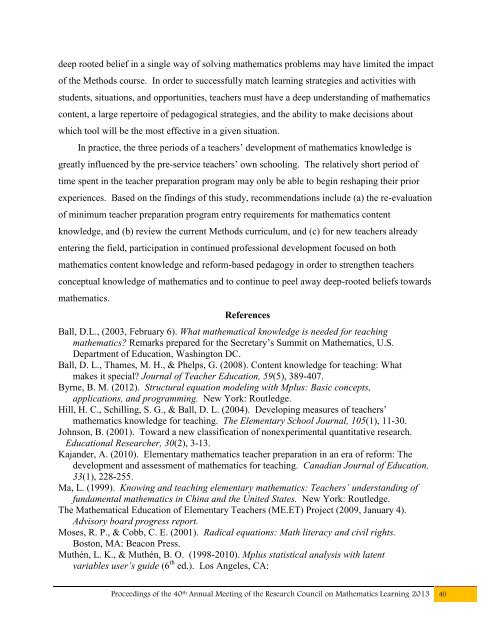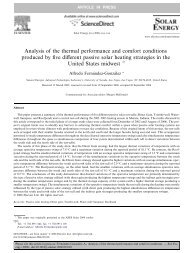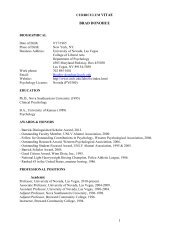2013 Conference Proceedings - University of Nevada, Las Vegas
2013 Conference Proceedings - University of Nevada, Las Vegas
2013 Conference Proceedings - University of Nevada, Las Vegas
- No tags were found...
Create successful ePaper yourself
Turn your PDF publications into a flip-book with our unique Google optimized e-Paper software.
deep rooted belief in a single way <strong>of</strong> solving mathematics problems may have limited the impact<strong>of</strong> the Methods course. In order to successfully match learning strategies and activities withstudents, situations, and opportunities, teachers must have a deep understanding <strong>of</strong> mathematicscontent, a large repertoire <strong>of</strong> pedagogical strategies, and the ability to make decisions aboutwhich tool will be the most effective in a given situation.In practice, the three periods <strong>of</strong> a teachers’ development <strong>of</strong> mathematics knowledge isgreatly influenced by the pre-service teachers’ own schooling. The relatively short period <strong>of</strong>time spent in the teacher preparation program may only be able to begin reshaping their priorexperiences. Based on the findings <strong>of</strong> this study, recommendations include (a) the re-evaluation<strong>of</strong> minimum teacher preparation program entry requirements for mathematics contentknowledge, and (b) review the current Methods curriculum, and (c) for new teachers alreadyentering the field, participation in continued pr<strong>of</strong>essional development focused on bothmathematics content knowledge and reform-based pedagogy in order to strengthen teachersconceptual knowledge <strong>of</strong> mathematics and to continue to peel away deep-rooted beliefs towardsmathematics.ReferencesBall, D.L., (2003, February 6). What mathematical knowledge is needed for teachingmathematics? Remarks prepared for the Secretary’s Summit on Mathematics, U.S.Department <strong>of</strong> Education, Washington DC.Ball, D. L., Thames, M. H., & Phelps, G. (2008). Content knowledge for teaching: Whatmakes it special? Journal <strong>of</strong> Teacher Education, 59(5), 389-407.Byrne, B. M. (2012). Structural equation modeling with Mplus: Basic concepts,applications, and programming. New York: Routledge.Hill, H. C., Schilling, S. G., & Ball, D. L. (2004). Developing measures <strong>of</strong> teachers’mathematics knowledge for teaching. The Elementary School Journal, 105(1), 11-30.Johnson, B. (2001). Toward a new classification <strong>of</strong> nonexperimental quantitative research.Educational Researcher, 30(2), 3-13.Kajander, A. (2010). Elementary mathematics teacher preparation in an era <strong>of</strong> reform: Thedevelopment and assessment <strong>of</strong> mathematics for teaching. Canadian Journal <strong>of</strong> Education,33(1), 228-255.Ma, L. (1999). Knowing and teaching elementary mathematics: Teachers’ understanding <strong>of</strong>fundamental mathematics in China and the United States. New York: Routledge.The Mathematical Education <strong>of</strong> Elementary Teachers (ME.ET) Project (2009, January 4).Advisory board progress report.Moses, R. P., & Cobb, C. E. (2001). Radical equations: Math literacy and civil rights.Boston, MA: Beacon Press.Muthén, L. K., & Muthén, B. O. (1998-2010). Mplus statistical analysis with latentvariables user’s guide (6 th ed.). Los Angeles, CA:<strong>Proceedings</strong> <strong>of</strong> the 40 th Annual Meeting <strong>of</strong> the Research Council on Mathematics Learning <strong>2013</strong> 40




